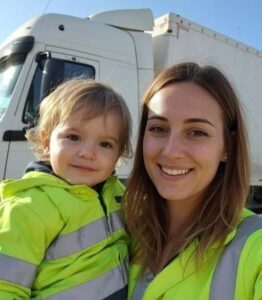I Bring My Toddler on Long Hauls—But Last Week, He Said Something That Shook Me to My Core

I’ve been behind the wheel since I was nineteen. Trucking isn’t just a job—it’s the rhythm my life beats to. When the cost of daycare got out of reach, I buckled a car seat into the passenger side of my rig and brought my little boy, Micah, along for the ride.
He’s just turned two. Fierce little thing. Sharp-eyed. Already mimicking my CB chatter like he’s got diesel in his veins. It’s not what you’d find in any parenting manual, but it’s what works for us. The cab is his playpen, the open road our backyard.
Most days, it’s just the two of us sharing miles and memories. We wear matching safety vests, split snacks, and belt out the same three truck-stop songs in laughable harmony. We sleep curled in the sleeper, wake up to engine hum, and fuel up on lukewarm coffee and giggles.
But something changed last week. Something I still can’t explain.
We were about 30 miles outside Amarillo. It was late—sky purple with dusk—and I pulled into a rest stop to check the straps on a load. Micah sat a few feet away, lost in play with his toy dump truck.
Then he looked up and asked, softly:
“Mama, when’s he coming back?”
I paused mid-latch. “Who, baby?”
“The man who sat in front yesterday. He gave me paper.”
My heart froze.
We ride alone. Always have.
I knelt down. “What man, Micah?”
He pointed to the passenger seat. “He was sitting there. He gave me something for you.”
I tried to steady my breath. Hours later, rifling through the glove box for my logbook, I found it: a folded piece of paper with “Micah” scribbled across the front.
Inside was a sketch. Pencil on white. Me at the wheel. Micah by my side, clutching his toy truck. I was handing him an apple slice.
At the bottom, in a familiar scrawl:
“Keep going. He’s proud of you.”
No signature. No return address. Just the unsettling feeling that someone knew us—and had been there.
I tucked the paper into the visor, unsure whether to feel comforted or unnerved. But the next morning, as we rolled west toward New Mexico, Micah kept glancing at the seat beside him, like waiting for someone to show up again.
That night, parked behind a roadside diner, I locked the cab tight. I couldn’t sleep. Every rustle of wind made my pulse race. Micah curled up against me, warm and small, unaware of the cold that had settled in my bones.
But the handwriting lingered in my mind. There was something familiar about it—something from another life.
Three days later, outside Flagstaff, a snow squall forced us off the interstate. At the truck stop, an older man approached.
“You’re the one traveling with the toddler?” he asked.
I nodded slowly.
“You should talk to Dottie inside,” he said. “She saw something strange yesterday. Thought you’d want to know.”
Inside, Dottie—gray-haired, sharp-eyed—wasted no time.
“Your rig was out back. I saw a man standing next to it,” she said. “Denim jacket. Beard. Tall. Looked like he was talking to someone through the window.”
I blinked. “But… we weren’t in the truck yesterday.”
She gave a small, solemn nod. “I know. But he was. And then he was gone—just gone. Like he stepped backward into the dark.”
She handed me a folded note. Another sketch.
This one showed Micah asleep on my chest, me gazing out the windshield, tears tracing down my cheeks.
And beneath it:
“You’re not alone. You never were.”
I climbed back into the truck, barely holding it together. That night, under an ink-black Arizona sky, it all clicked.
The drawings. The loops in the handwriting. The strange peace Micah felt around the unseen.
It was Jordan.
My older brother. My protector. My best friend.
He died six years ago. A drunk driver hit him just after a double shift at the factory. He never got to meet Micah. Never got to see me behind the wheel.
But Jordan used to sketch just like that. Simple. Real. Full of feeling.
I cried harder than I have in years. Not out of fear—but because I knew. Somehow, deep in my gut, I knew: he’s still riding with us.
Things have changed since.
Not in ghost story ways—no flickering lights or vanishing figures. Just… subtle shifts.
Micah mumbling, “Uncle Jo says slow down,” right before I miss a sharp turn. A lost binky showing up in the glove box. New sketches appearing tucked into our trip logs, Micah’s coloring books, even inside my jacket pocket.
One note came after a grueling delivery in Missouri. It was a sketch of me outside the cab, sun rising behind me, exhaustion on my face. Beneath it:
“Keep driving. You’re building something beautiful.”
I’ve kept them all. Nine sketches. Nine moments that remind me that love can reach beyond the grave—and into a cab bound for anywhere.
The last one came just days ago outside Sacramento. I was tired. Worn out. Questioning everything.
Inside the truck fridge, taped to a milk carton, was the latest message:
“He’ll remember this—your strength, your love. Not the miles.”

So I’m sharing this now, not for attention, but because maybe someone else needs to hear it:
Love doesn’t vanish. It reroutes.
Sometimes the road gives back. Sometimes those we’ve lost never left at all.
So if you ever feel someone’s presence just when you need it most—listen. Look closer.
Check the glove box. You might find a note.
And if you do… keep it. That’s love, just changing seats.